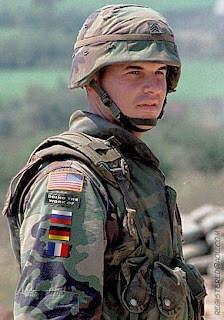
Kuchi tribesmen gather June 8 at the Daymardad District Center to speak with Ali Khashe, deputy governor for Wardak Province, Afghanistan. Photo by Sgt. Rob Frazier
By Sgt. Rob Frazier
5th Mobile Public Affairs Detachment Journalist
WARDAK PROVINCE, Afghanistan – Every summer, the Kuchi tribe migrates through the Daymardad District, allowing their animals to graze in open pastures belonging to the Hazara tribe. This has frequently sparked violent territorial disputes. After hearing of the conflict, U.S. forces at Forward Operating Base Airborne approached Wardak Province Governor Mohammad Halim Fidai about a peaceful way to resolve fighting between the two tribes. "The mission was inspired from the age-old conflict between the Kuchi nomads and the Hazara," said Maj. Joe Asher, deputy civil affairs officer for 3rd Brigade Combat Team, 10th Mountain Division (LI). "Three weeks ago we went to Daymardad, and it was a very positive step for us. The Kuchi elders said they would not migrate if they were given food, water and vaccination supplies for their animals."Once learning of a possible solution, Soldiers from 4th Battalion, 25th Field Artillery Regiment, delivered the first installment of humanitarian aid to the Daymardad people."We hope this demonstrates that we're saying, 'Hey, we're taking the steps to alleviate your problems,'" Asher said. "Although this is funded by us, it's important for the Kuchi and Hazara to know this is enacted by the Afghan government."The first installment included sacks of beans, sugar, flour, rice and boxes of cooking oil. Asher added that a second shipment of humanitarian aid would likely be made within the next week."We plan to follow this up with water, tents and veterinarian supplies," Asher added. "This way, the Kuchi won't have to move their livestock, because they will have what they need."Ali Khashe, deputy governor for Wardak Province, was on hand to greet Soldiers and meet with Kuchi tribesmen before handing out the food. Inside the district center, Khashe fielded questions from the elders regarding water and vaccination requests for their livestock.Khashe said he knows their issues cannot be solved all at once, but he hopes they understand leaders are working hard to meet their needs."The governor's office is trying to solve their problems," Khashe added. "It's our priority to convince the two tribes to live like brothers."According to Khashe, the humanitarian aid was a step in the right direction and another example of coalition efforts to help the Afghan people. "The district center and the people here all know the U.S. comes to help," Khashe said. "They are very happy, because everyone knows the U.S. forces came to help rebuild Afghanistan. We are very grateful for their assistance."Asher added that with U.S. assistance and cooperation from the Wardak government, the humanitarian aid will signal the start of a change for the Kuchi and Hazara tribes in the Daymardad region."Hopefully this will result in the first nonviolent summer between them in a long time."
Special thanks to the Fort Drum Blizzard




 Staff Sgt. Melissa Dion, a medic at Fort Drum, and her 9-year-old son, Ryan, are honored during the Operation Homefront Military Motherhood Award ceremony May 27 at the Pentagon. Photo by Lacey Justinger
Staff Sgt. Melissa Dion, a medic at Fort Drum, and her 9-year-old son, Ryan, are honored during the Operation Homefront Military Motherhood Award ceremony May 27 at the Pentagon. Photo by Lacey Justinger





